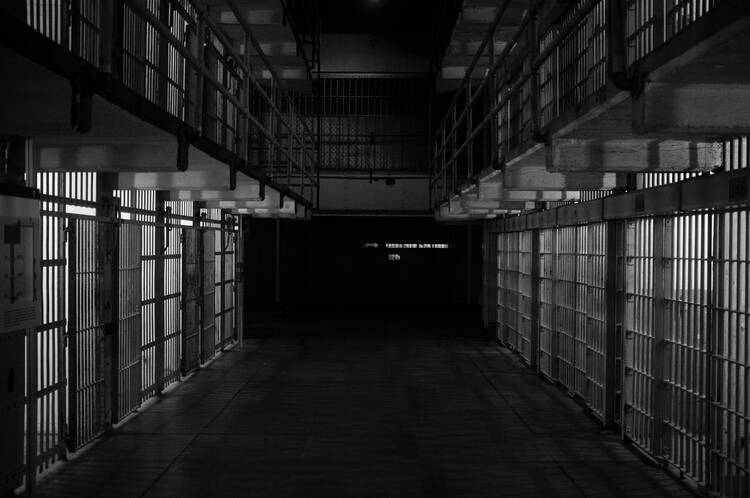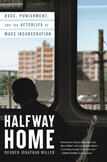Review: Platitudes are not enough. We need to see criminal justice reform in action.
Read this book. You will be stirred, and maybe you will feel a bit uncomfortable. That is a good thing.
Reuben Jonathan Miller’s work of narrative nonfiction, Halfway Home: Race, Punishment, and the Afterlife of Mass Incarceration, mixes personal memoir with science, sociological data and anthropology as it describes the brutal effects of the carceral state in the United States—particularly on Black people.
Criminal justice reform is on the lips of almost anyone running for political office these days, regardless of party affiliation. But on the streets of Chicago or Detroit or Ann Arbor, Mich., where Miller walked for years to gather his data and stories, one would be hard-pressed to find it in action. There is a massive lack of connection between the platitudes like “We must do better” and the Black children and adults who have had their entire lives transformed by a “war on crime” now several decades old.
Using firsthand interviews with about a dozen men and women after their incarceration and release, Miller cuts through the noise about criminal justice reform to lay bare what life is really like on the other side of a prison sentence. Informed by his experience as a Black man who grew up poor in a segregated Chicago, as well as the lives of his own family members touched by the carceral state, Miller is able to coax the hopes and dreams, fears and terrors out of his interview subjects. The result is a searingly honest view of life after incarceration.
In Halfway Home, Miller is able to coax the hopes and dreams, fears and terrors out of his interview subjects. The result is a searingly honest view of life after incarceration.
Do you have a roof over your head while you are reading this review? Are you housed in a place that feels safe? The majority of men and women leaving prison each year do not share those settings or that safety. Some of Miller’s subjects, including his older brother, Jeremiah, walk us through their journey of looking for housing. Miller lets them guide us through his ethnography of the community while expertly weaving in social science, empirical data and reflections on public policy to reveal the traps laid for them.
In Chicago, for example, there are more than 50 policies that bar people with criminal records from housing. (The same trend can be seen across the country, thanks to aggressive policies enacted under President Clinton in the 1990s.) The cruelty and negative impact of those policies are clear to see. If you are on parole or probation, it is a crime to be homeless. If you are living in public housing or your private landlord does not permit anyone with a criminal history to be in your apartment, you can be evicted for trying to help out a loved one by letting them stay with you. Some men and women languish in prison for months (or years) after their parole was scheduled to begin because they have nowhere to live.
Miller talks to a halfway house director who gets hundreds of applications every year for between 20 and 40 beds. Miller himself says no to his brother’s request to stay with him because he could be evicted from his rented house for having his brother stay there. His brother ends up sleeping in a parking lot from time to time in Ann Arbor while he awaits trial.
This landscape exists for every person leaving prison or jail, and it is often one they have to learn to navigate alone. Want to get a job so that you can pay for an apartment that is not public housing? Good luck if you have a criminal record, even if all you hope to obtain is a minimum-wage job. Want to watch your child graduate from kindergarten? If you were in prison for over a year, your parental rights may have been terminated during your stay, and your child may no longer be yours.
Want to vote for a politician who may be able to make a change in your community? Sorry, a criminal record often revokes your voice in elections. Want to get on track with a new lifestyle and focus on your health? You are far behind the rest of us, as incarcerated persons are more likely than anyone else in the United States to contract communicable diseases and illnesses. Just look at the number of Covid-19 prison deaths in the United States to see the outsized impact this pandemic has had on those behind bars.
Halfway Home is an intimate portrayal of a vulnerable population; it is also important and necessary.
The men and women we meet through Miller find themselves rejected time and again in their efforts to establish safe new lives after incarceration. This makes Halfway Home a tough book to read. It should be.
It is an indictment of our society, the one with an ever-increasing wealth gap, the one that let me take out six figures in federal student loans because I am considered a “trustworthy candidate” but didn’t let Yvette, one of Miller’s subjects, continue to work for her town because of an uncovered 10-year-old drug conviction, despite her excellence at her job.
I am not a stranger to the data points and the policy arguments for criminal justice reform and for the abolition of our current carceral state. As both a criminal defender and family defender for the last five years, I have watched the government’s prosecutions tear apart Black families, force evictions and traumatize Black children. But at the end of the day, I can still close my files and go home without those stories following me. Miller brings us along on the car ride home, then shows us the musings on the couch and the celebration on the corners.
Halfway Home is an intimate portrayal of a vulnerable population; it is also important and necessary. Until there are laws and frameworks that clear the minefields of post-conviction life, we are all complicit in setting up our neighbors, our brothers and sisters, for failure. Until that culture of rejection turns into one of reception, this book will be necessary.
Miller does not apologize for having a dog in this fight. His proximity to his subjects and the world of mass incarceration, he believes, gives him the ability to communicate how this social situation feels in a forceful and straightforward way. I could not agree more.
I could not put this book down because I felt so connected to the author, his story and his subjects’ stories. I will be thinking about it for a long time.
This article also appeared in print, under the headline “Criminal Injustice,” in the May 2021, issue.











